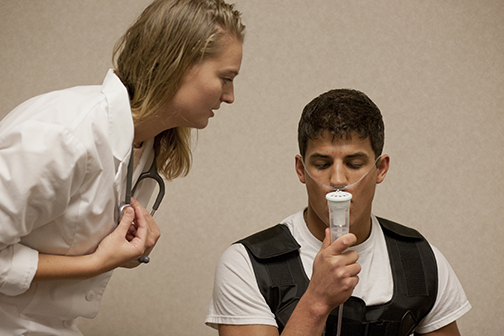Respiratory Care is an allied health profession that specializes in the evaluation, treatment, and education of patients with cardiopulmonary (heart-lung) disorders. Respiratory therapists (RTs) work closely with patients, physicians, nurses and other healthcare team members in critical care, emergency rooms, nurseries and pediatrics, medical units and home care. RTs' diverse responsibilities include patient assessment, medical gas therapy, pulmonary hygiene, diagnostic testing, mechanical ventilatory and cardiovascular support, rehabilitation activities, and consulting with physicians to develop treatment plans.
Background Information
The practice of respiratory care encompasses activities in diagnostic evaluation, therapy, and education of the patient, family and public. Diagnostic activities include obtaining and analyzing sputum and blood specimens, performing breathing studies to determine if lung function is impaired, performing sleep disorder studies and interpreting the data obtained from these. Therapy includes administering medical gases and respiratory medications to alleviate breathing problems, initiating and managing mechanical ventilators, establishing and maintaining artificial airways, performing pulmonary hygiene procedures and cardiopulmonary rehabilitation activities. Education of the patient, family and public promotes knowledge of disease processes, therapy and wellness. These essential functions of the RT are practiced under qualified medical direction.
Career Opportunities
Graduates of the respiratory care program are eligible to complete a series of national examinations administered by the National Board of Respiratory Care that lead to the Registered Respiratory Therapist (RRT) credential. NDSU graduates have enjoyed excellent pass rates on these certifying exams. Most states require a license to practice respiratory care and use these examinations or verification of credentials for state licensing. To remain licensed, RTs may also be required to obtain continuing education credit. Graduates readily find employment in hospital, clinic and home care settings throughout the country. Additional career opportunities exist in management, education, sleep medicine, research, sales and public health. According to the U.S. Department of Labor Bureau of Labor Statistics, employment of respiratory therapists is expected to grow much faster than the average for all occupations through the year 2026. This increased demand is attributed to growth in the middle-aged and elderly populations that will increase the incidence of respiratory conditions, advances in preventing and detecting disease, and improved medications and sophisticated treatments. Mean annual wages for respiratory therapists in 2022 was $70,540 (Respiratory Therapists : Occupational Outlook Handbook: : U.S. Bureau of Labor Statistics (bls.gov).
The NDSU/Sanford Respiratory Care Program
A Bachelor of Science degree with a major in respiratory care from North Dakota State University includes two to three years of academic courses and a 15-month professional-level internship at Sanford Medical Center Fargo. The NDSU/Sanford Respiratory Care program is accredited by the Commission on Accreditation for Respiratory Care.
Academic courses include college algebra, chemistry, physics, anatomy and physiology, microbiology, psychology and computer science, in addition to general education courses. Transfer students need to successfully complete a minimum of 8 resident credits at NDSU prior to starting the internship. The full-time internship consists of lecture, lab and clinical education, which prepares the student to enter the profession of respiratory care.
Near the end of the internship, students design a specialty proposal for a focused clinical experience (RC 494, Individual Study). Common specialty areas include: neonatal/pediatric general or intensive care, adult general or intensive care, cardiopulmonary diagnostics, pulmonary rehabilitation or home care, education, and management.
Internship Admission
Admission to the internship is selective. Qualified students apply during the spring of the academic year during which they will complete all courses on campus. Admission is based upon successful completion of all internship prerequisites (8 resident credits at NDSU), cumulative and core course grade point averages (a minimum of 2.50 is required; the maximum number of core course attempts is two), related experience, references, an interview, and compliance with criminal background and student conduct requirements. In addition, students admitted to the NDSU/Sanford Respiratory Care Program must possess the ability to complete the entire curriculum which requires that the student meet designated technical standards, or request accommodations to execute these skills. Technical standards include cognitive, physical, motor and tactile abilities, visual acuity, and speaking, hearing and interactive requirements. Internship applications are available from the NDSU Department of Allied Sciences. Deadline for receipt of completed applications is March 1. An admission committee selects the interns.
It is highly recommended that students interested in the RC major meet with the respiratory care advisor to discuss degree requirements, internship admission, and create an individualized plan of study at least one year in advance of applying for the internship. Information about the profession, curriculum, internship, technical standards, and advising contacts are available from the Department of Allied Sciences.
Sample Program Guide
IMPORTANT DISCLAIMER: This guide is not an official curriculum. This guide is a sample four-year degree plan of how students might plan this major with other degree requirements to complete their education in four years.Student plans will vary from this sample due to a variety of factors, such as, but not limited to, start year, education goals, transfer credit, and course availability. To ensure proper degree completion, enrolled students should utilize Degree Map and Schedule Planner in Campus Connection and consult regularly with academic advisors to ensure graduation requirements are being met.

